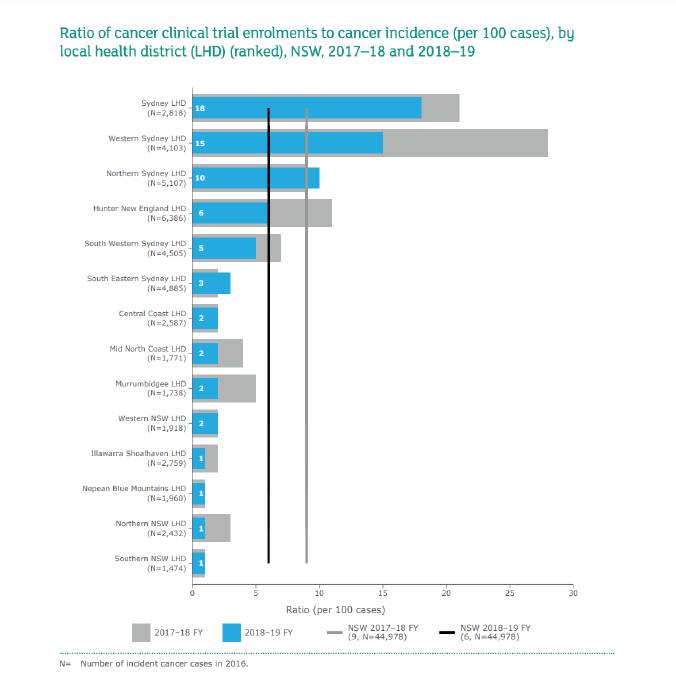Higher out-of-pocket-expenses, poorer outcomes and a lack of access to clinical trials were among the disadvantages faced by cancer patients in rural and regional NSW compared to those living in metropolitan areas.
Subscribe now for unlimited access.
or signup to continue reading
In some cases cancer patients in rural and regional NSW opted to either miss appointments or shorten their treatment due to the costs involved and the difficulties of accessing treatment.
These were the messages being delivered by cancer organisations including the Cancer Council and Can Assist to the NSW Parliamentary Inquiry into Health Outcomes and access to Health and Hospital Services in Rural, Regional and Remote NSW .
The inquiry held hearings earlier this month where Jeff Mitchell, CEO, Cancer Council, told the inquiry members cancer outcomes in NSW are among the best in the world, yet for people living in rural and remote NSW outcomes remain poor compared to people living in metropolitan areas.
"There has been little progress in narrowing this gap in the past 20 years. Everyone with cancer deserves the best chance of living well and yet evidence clearly demonstrates that the chance of being diagnosed with cancer and dying from cancer increases with distance from major centres. Unfortunately, the reality is that a person's experience of cancer is a postcode lottery," he told the Inquiry.
"One of the clearest things that we hear from people we assist is that they did not expect a cancer diagnosis to be so expensive. The out-of-pocket costs faced by people with cancer are higher for people outside of metropolitan areas, so much so that one in five people with cancer in regional NSW report that they skip health appointments because of the cost.
"People should not be forced to choose between getting cancer care or paying their bills. Lifting reimbursement rates for the Isolated Patient Travel Accommodation and Assistance Scheme (IPTAAS) and broadening its eligibility will go a long way to relieving this financial and emotional toll.
"And, importantly, we believe addressing out-of-pocket costs for cancer treatment will reduce inequality, because your postcode should not determine whether you can afford treatment or not. These inequalities do not just exist across the country and city divide; out-of-pocket cost inequalities also exist between different regional communities."
To highlight the need to increase the IPTAAS Mr Mitchell quoted the example of the NSW Government employee being reimbursed for travel, currently at the Australian Taxation Office rate, which is 72c per kilometre whereas IPTAAS is currently 22c per kilometre.
Cancer Council Regional Communities Cancer (RCC) survey found that more than half of all people surveyed had to travel greater than 100km for cancer care.
The Council is also calling for the relaxing of the 200km cumulative eligibility criteria to allow automatic qualification if a treatment schedule dictates that a patient will accumulate 200km of travel.
Another major reason for the poorer outcomes for rural and regional cancer patients is the lack of access to clinical trials. Clinical trials can provide patients access to cutting edge therapies and expand treatment options but currently, less than 5% of regional cancer patients participate in any clinical trial.
The major barrier to people outside metropolitan areas is distance. Until recently, clinical trials were almost exclusively conducted in metropolitan hospitals.
Cancer Council research found that for those accessing clinical trials from regional NSW, nearly half (47%) reported major or severe difficulties.
According to the Council clinical trials can be resource intensive and recruiting enough participants to meet often very restrictive eligibility criteria can be challenging. For traditional clinical trial models, it is simply easier and cheaper to run trials from hospitals with established workforce experience, skills, capacity and easy access to large populations from which to recruit.
Another barrier to accessing clinical trials for people outside of metropolitan areas is that eligibility for travel and accommodation assistance excludes clinical trials.
The costs of travel and accommodation to major centres were trials are most commonly run can be prohibitive. Financial assistance through IPTAAS for people needing to travel significant distances to access clinical trials is currently denied.
Cancer Council says expanding eligibility criteria fro IPTAAS to explicitly include travel for people accessing a clinical trial would greatly assist patients.
New models of care utilising telehealth can help address many of these practical issues by providing care that is patient centred, effective and efficient, and not reliant on physical infrastructure. The benefits of these innovations are not yet fully realised the Cancer Cancer says.
The NSW Cancer Institute monitors clinical trial enrolments from each district and can be found here.



